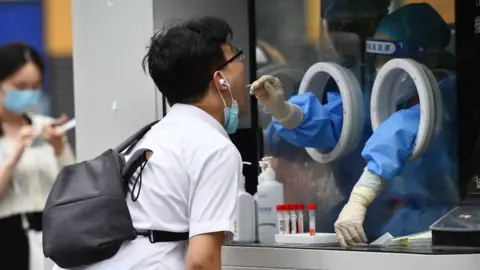Covid in China: Chengdu lockdown after outbreak
 Getty Images
Getty ImagesChengdu has become the latest Chinese city to be locked down as Beijing continues to pursue its controversial "zero-Covid" policy.
Around 21 million people have been ordered to stay indoors, with just one person per household allowed out for essential shopping.
On Thursday, the city recorded 157 new infections, including 51 asymptomatic.
China's Covid policies require cities to enter strict lockdowns - even if just a handful of cases are reported.
However, Beijing's drive to ensure "zero Covid" has been accused of stifling economic growth, and has prompted rare public dissent from citizens.
Chengdu's residents, asked to stay at home from 18:00 local time (10:00 GMT) on Thursday, will all be tested over the coming days, but it was not clear when restrictions would be lifted.
In the meantime, people have been banned from entering or leaving Chengdu, the capital of the south-west Sichuan province, with only residents able to show evidence of a negative Covid test allowed out to buy necessities.
State media also reports that the start of schools' autumn term has been postponed and flights have been grounded.
Health authorities labelled the situation "extremely complex and severe" and blamed the outbreak on mass gatherings during warm weather at a pair of swimming and entertainment venues.

China's recent Covid crackdowns
- March: China's largest lockdown of the pandemic, in Shanghai, lasts two months and leads to widespread reports of food shortages and poor living conditions in quarantine centres
- June: A high-speed train is halted and its passengers ushered to an isolation centre after a passenger was linked to a Covid cluster
- July: Much of Wuhan re-enters lockdown after the discovery of four positive cases
- August: Chaotic scenes are caught on camera in Shanghai as health officials attempt to shut shoppers in a branch of Ikea to quarantine a close contact of a positive Covid case
- August: Footage is shared on Chinese social media showing fish and crabs receiving PCR tests
- August: Chinese volleyball officials apologise following an outcry when the women's national team is pictured playing a match wearing face masks

Other restrictions are currently in force elsewhere in China, including in Shenzhen in the south and Dalian in the north-east.
The country has deployed a range of city-specific Covid prevention measures after the initial wave of the virus hit Wuhan in 2019.
China is the world's last major economy attempting to entirely stamp out Covid outbreaks, claiming this is necessary to prevent wider surges of the virus which could overwhelm hospitals.
The country has officially recorded fewer than 15,000 deaths since the pandemic began, according to Johns Hopkins University.